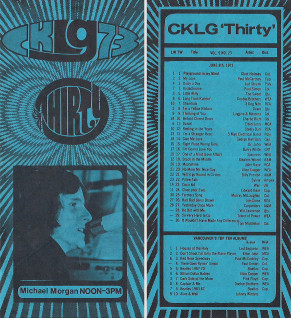Do we need CanCon for print media?
The Canadian content regulations established by the CRTC in 1971 played a major part in building our homegrown music industry. What would happen if we applied those principles to Canada’s news media sector?

In my hometown of Kelowna, B.C., in 1970, you bought your records at the Music Box store on Ellis Street. Each week you’d travel downtown to choose from the new 45s and albums that you’d heard on the local radio station. And while you were there you’d pick up the latest list of the top 30 records being played on Vancouver’s powerhouse station CKLG.
Looking at those old charts today, you’d be struck by one thing: aside from an occasional appearance by Anne Murray or the Guess Who, you would almost never see a Canadian artist in the Top 30. The charts were dominated by American and English musicians. The assumption at CKLG, and among its listeners, was that popular music came from those places, not from Canada.
Because there was little airplay for our musicians, there was also very little recording industry infrastructure in Canada. Becoming successful in music back then meant going to the U.S. to record, work and live. Today, by contrast, it’s hard to keep track of all of the Canadian artists who enjoy successful careers here and abroad. Everyone from Drake on down is able to record here and build a global profile without leaving the country. That wouldn’t have happened without Canadian content regulations.

The Top Thirty playlist for Vancouver's CKLG radio station in June 1973.
In 1968, the federal government of Pierre Trudeau passed the Broadcasting Act, which established the Canadian Radio-television and Telecommunications Commission (CRTC). In 1971, the CRTC established its Canadian Content regulations, which required radio stations to air songs with a Canadian component at least 25 per cent of the time. That quota has increased in subsequent decades, as the number of Canadian artists and recordings grew.
“Canadianness” was defined using the MAPL system. To qualify as CanCon, as it became known, a musical selection must generally fulfill at least two of the following conditions: the Music is composed entirely by a Canadian; the song’s music and lyrics are performed principally by a Canadian Artist; the music consists of a live Performance recorded or performed wholly in Canada and broadcast live in Canada; and the Lyrics are written entirely by a Canadian.
In the nearly 50 years since the CanCon regulations were introduced, radio broadcasters might have complained about being forced to play Canadian artists, but even they have to acknowledge that this has led to a thriving, internationally successful Canadian music industry. When you look at Shania Twain, Michael Bublé or even Polaris Music Prize winners like Godspeed You! Black Emperor or Arcade Fire, you’re looking at performers who would never have had major airplay or internationally successful careers before 1970. The CanCon regulations also led to a shift in the public’s perception: new music is judged on its merits instead of being rejected because it’s Canadian.
But while Canada’s music industry is thriving, our news media is suffering. Major newspapers are negotiating the details of a government bailout while laying off reporters. The Writers Union of Canada reports a 50 per cent drop in sales for Canadian-authored books, a 20 per cent drop in the borrowing of Canadian books from libraries, and a 78 per cent income decline for Canadian authors over the last two decades. Meanwhile, weekly papers and magazines are hanging on by the skin of their teeth.
Money is not enough. What’s really needed is a program that will do for our writers what CanCon did for our musicians.
Throwing more money at Canadian writers and publishers would help, as will the Copyright Board’s decision that the royalties many post-secondary institutions have been refusing to pay authors will be restored. But money is not enough. What’s really needed is a program that will do for our writers what CanCon did for Canadian musicians.
The Liberal media bailout is not what is needed. Even though those in Ottawa might believe that print newspapers and TV news are what matter most, the reality is that large parts of the Canadian public have moved away from these older media outlets. Underwriting newspaper reporters’ salaries won’t significantly change the media landscape because it ignores the fundamental shift away from traditional outlets like PostMedia and the Globe and Mail toward the hundreds of online publishers that provide the information that the big dailies no longer provide.
What the government of Pierre Trudeau did in the 1968 Broadcasting Act was far more valuable than just handing out money to record companies. His government took a leap of faith and trusted that Canadian music fans would embrace homegrown talent if they got the chance to hear it. It established one simple and measurable rule: your radio station will play Canadian music 25 per cent of the time.
Eventually this proved to be more successful than even the CRTC could have expected. By forcing radio stations to play our musicians, the CRTC created a fan base for Canadian performers, which led to more music venues, recording studios, and an industry that understood that our artists are as good as those from the U.S. or England.
Instead of asking how to shore up failing news giants, the Liberals could make it their priority to get Canadian books, magazines and websites into the hands of Canadians.
What I would hope for from Trudeau’s son Justin is a similar approach to building – or rebuilding – our news media sector. Instead of asking how they could shore up failing news giants like Postmedia, the Liberals could have made it their priority to do everything possible to get Canadian books, magazines, websites and articles into the hands and smartphones of Canadians.
The media bailout won’t do this. Even while the big newspapers wait for the money to arrive, the Toronto Star announced the end of its Star Metro commuter papers. Despite having part of their payroll covered by Ottawa, there’s no indication that the big media companies plan to significantly increase their reporting staffs. What growth is happening in the news media sector is happening outside of newspapers, in websites and podcasts.
What the media bailout does not acknowledge is that the people who no longer pay for a daily newspaper or its online equivalent are still spending money on media. The difference is that they’re using Patreon or PayPal to support publishers that span the political spectrum. If our traditional news media are dying, it’s because they have stopped delivering what Canadian readers and viewers find appealing.
Like many Canadians, I no longer subscribe to a daily newspaper. As much as I love newsprint, I can’t justify the cost when there seems to be so little that I want to read, and when breaking news is covered so much faster by Twitter. For me, at least, it also matters when Canadian papers endorse politicians and policies that I just can’t support. When every Postmedia paper in the country endorsed Andrew Scheer during the recent election – despite Trudeau “bribing” them with the newspaper bailout – I knew that I didn’t want to give them my money.
What we learned in the 1970s was that Canadians will embrace homegrown music if they can be shown that it’s as good or better than the international choices. There’s no reason to believe that the same people wouldn’t choose to read Canadian books, newspapers and websites – and pay for them. The challenge for the Canadian government is how to do for the news media universe what CanCon did for our musicians. It will be hard to accomplish this in an age of unregulated internet giants, and the Facebooks and Googles will fight it, but if being Canadian is worth anything, it’s a challenge that we need to accept.
